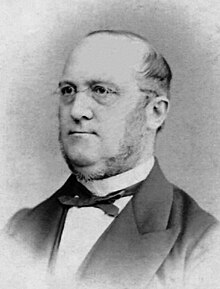Hermann Kolbe | |
|---|---|
 Kolbe, c. 1860 | |
| Born | Adolph Wilhelm Hermann Kolbe 27 September 1818 Elliehausen, near Göttingen, Kingdom of Hanover |
| Died | 25 November 1884 (aged 66) |
| Nationality | German |
| Alma mater | University of Marburg |
| Known for | Kolbe electrolysis, Kolbe–Schmitt reaction Kolbe nitrile synthesis |
| Awards | Davy Medal (1884) ForMemRS (1877) |
| Scientific career | |
| Fields | Chemist |
| Institutions | University of Marburg University of Leipzig |
| Doctoral advisor | Robert Bunsen Friedrich Wöhler |
| Doctoral students | Peter Griess Aleksandr Mikhailovich Zaitsev Theodor Curtius Ernst Otto Beckmann Carl Graebe Oscar Loew Constantin Fahlberg Nikolai Menshutkin Vladimir Markovnikov Jacob Volhard Ludwig Mond Alexander Crum Brown Maxwell Simpson Frederick Guthrie [Note, not primary advisor for all in this list] |
Adolph Wilhelm Hermann Kolbe (27 September 1818 – 25 November 1884[1]) was a major contributor to the birth of modern organic chemistry. He was a professor at Marburg and Leipzig. Kolbe was the first to apply the term synthesis in a chemical context, and contributed to the philosophical demise of vitalism through synthesis of the organic substance acetic acid from carbon disulfide, and also contributed to the development of structural theory. This was done via modifications to the idea of "radicals" and accurate prediction of the existence of secondary and tertiary alcohols, and to the emerging array of organic reactions through his Kolbe electrolysis of carboxylate salts, the Kolbe-Schmitt reaction in the preparation of aspirin and the Kolbe nitrile synthesis. After studies with Wöhler and Bunsen, Kolbe was involved with the early internationalization of chemistry through work in London (with Frankland). He was elected to the Royal Swedish Academy of Sciences, and won the Royal Society of London's Davy Medal in the year of his death. Despite these accomplishments and his training important members of the next generation of chemists (including Zaitsev, Curtius, Beckmann, Graebe, Markovnikov, and others), Kolbe is best remembered for editing the Journal für Praktische Chemie for more than a decade, in which his vituperative essays on Kekulé's structure of benzene, van't Hoff's theory on the origin of chirality and Baeyer's reforms of nomenclature were personally critical and linguistically violent. Kolbe died of a heart attack in Leipzig at age 66, six years after the death of his wife, Charlotte.